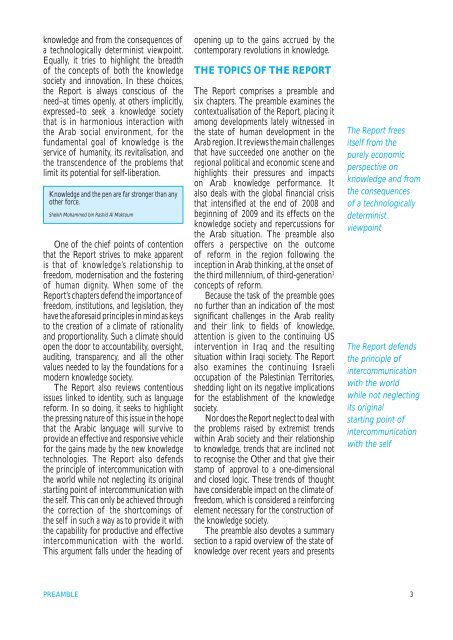Arab Knowledge Report 2009: Towards Productive
Arab Knowledge Report 2009: Towards Productive
Arab Knowledge Report 2009: Towards Productive
- No tags were found...
You also want an ePaper? Increase the reach of your titles
YUMPU automatically turns print PDFs into web optimized ePapers that Google loves.
knowledge and from the consequences ofa technologically determinist viewpoint.Equally, it tries to highlight the breadthof the concepts of both the knowledgesociety and innovation. In these choices,the <strong>Report</strong> is always conscious of theneed–at times openly, at others implicitly,expressed–to seek a knowledge societythat is in harmonious interaction withthe <strong>Arab</strong> social environment, for thefundamental goal of knowledge is theservice of humanity, its revitalisation, andthe transcendence of the problems thatlimit its potential for self-liberation.<strong>Knowledge</strong> and the pen are far stronger than anyother force.Sheikh Mohammed bin Rashid Al MaktoumOne of the chief points of contentionthat the <strong>Report</strong> strives to make apparentis that of knowledge’s relationship tofreedom, modernisation and the fosteringof human dignity. When some of the<strong>Report</strong>’s chapters defend the importance offreedom, institutions, and legislation, theyhave the aforesaid principles in mind as keysto the creation of a climate of rationalityand proportionality. Such a climate shouldopen the door to accountability, oversight,auditing, transparency, and all the othervalues needed to lay the foundations for amodern knowledge society.The <strong>Report</strong> also reviews contentiousissues linked to identity, such as languagereform. In so doing, it seeks to highlightthe pressing nature of this issue in the hopethat the <strong>Arab</strong>ic language will survive toprovide an effective and responsive vehiclefor the gains made by the new knowledgetechnologies. The <strong>Report</strong> also defendsthe principle of intercommunication withthe world while not neglecting its originalstarting point of intercommunication withthe self. This can only be achieved throughthe correction of the shortcomings ofthe self in such a way as to provide it withthe capability for productive and effectiveintercommunication with the world.This argument falls under the heading ofopening up to the gains accrued by thecontemporary revolutions in knowledge.THE TOPICS OF THE REPORTThe <strong>Report</strong> comprises a preamble andsix chapters. The preamble examines thecontextualisation of the <strong>Report</strong>, placing itamong developments lately witnessed inthe state of human development in the<strong>Arab</strong> region. It reviews the main challengesthat have succeeded one another on theregional political and economic scene andhighlights their pressures and impactson <strong>Arab</strong> knowledge performance. Italso deals with the global financial crisisthat intensified at the end of 2008 andbeginning of <strong>2009</strong> and its effects on theknowledge society and repercussions forthe <strong>Arab</strong> situation. The preamble alsooffers a perspective on the outcomeof reform in the region following theinception in <strong>Arab</strong> thinking, at the onset ofthe third millennium, of third-generation 1concepts of reform.Because the task of the preamble goesno further than an indication of the mostsignificant challenges in the <strong>Arab</strong> realityand their link to fields of knowledge,attention is given to the continuing USintervention in Iraq and the resultingsituation within Iraqi society. The <strong>Report</strong>also examines the continuing Israelioccupation of the Palestinian Territories,shedding light on its negative implicationsfor the establishment of the knowledgesociety.Nor does the <strong>Report</strong> neglect to deal withthe problems raised by extremist trendswithin <strong>Arab</strong> society and their relationshipto knowledge, trends that are inclined notto recognise the Other and that give theirstamp of approval to a one-dimensionaland closed logic. These trends of thoughthave considerable impact on the climate offreedom, which is considered a reinforcingelement necessary for the construction ofthe knowledge society.The preamble also devotes a summarysection to a rapid overview of the state ofknowledge over recent years and presentsThe <strong>Report</strong> freesitself from thepurely economicperspective onknowledge and fromthe consequencesof a technologicallydeterministviewpointThe <strong>Report</strong> defendsthe principle ofintercommunicationwith the worldwhile not neglectingits originalstarting point ofintercommunicationwith the selfPREAMBLE3
















